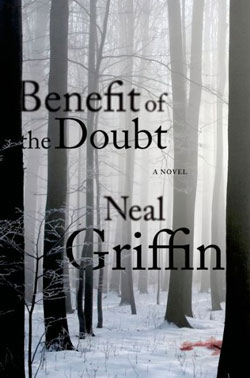 Benefit of the Doubt by Neal Griffin is a debut crime novel about a disgraced big-city cop who learns his tiny hometown is no safe haven from corruption (available May 12, 2015).
Benefit of the Doubt by Neal Griffin is a debut crime novel about a disgraced big-city cop who learns his tiny hometown is no safe haven from corruption (available May 12, 2015).
This gritty debut novel from a former law-enforcement officer is a hard-hitting look at police corruption in small-town America, laced with an impressive amount of insider information on police work, mentality and culture. Our hero, Ben Sawyer, was a hot-shot Oakland PD sergeant, until a moment of violent madness nearly cost him everything:
[The gangbanger]'s hands came off the [other] cop's gun and went high over his head in a clear display of unconditional surrender. His eyes filled with terror as he looked awkwardly toward the gun that was still poised at the side of his head. His expression said it all. Hector knew [Ben] would not hesitate to kill him.
It could have ended there, and if it had, Ben figured he would have received a commendation for lifesaving. Hell, not only for saving the cop, but he even managed to keep Hector alive. Avoiding an officer-involved shooting always gave the department brass something to brag about. Yep. It could have been a great day for the Sawyer legacy. A hell of a war story for the locker room: how Sawyer almost performed a gangbanger street execution with his forty-cal. But it didn't end there. Sawyer was just getting started.
Ben’s anger management and trust issues soon drive him and his family out of Oakland. When his father-in-law, Chief of Police Lars Norgren, offers him a sergeant's position in his hometown of Newberg, Wisconsin, Ben feels that accepting the job is his only way to move forward. His wife, Alex, is initially thrilled by the idea, but their teenage son, Jake, is less happy to have to move.
When Lars is felled by a stroke, Ben soon finds his position at the precinct tenuous, mostly due to the machinations of new Police Chief Jorgensen and Jorgensen‘s go-to guy, Detective McKenzie. The stress of having the invalid Norgren to care for also adds pressure to the Sawyers’ already tense home life. When Harlan Lee, a wrongfully convicted felon with revenge on his mind, is released from prison, he quickly sets in motion a deadly chain of events that blindsides Ben entirely. Soon, Ben must question who he can trust as his world begins collapsing around him.
One person who stays reliable throughout is also easily my favorite character in the novel: the lovely and determined patrol officer, Tia Suarez. One of the few non-white people to grow up in distinctly Nordic Newberg, she joined the military after high school and served in Afghanistan before deciding that her heart belonged back in her hometown, despite her parents having long returned to Jalisco, Mexico, where they’d grown up. She bonds with Ben over the fact that they’re both unfairly viewed as outsiders, and proves not only his most loyal supporter but also his most resourceful, using the skills and contacts she gained working military intel to aid him in his quest to unravel the truth. Pragmatic to the core, she explains to him why she thinks the case they’re investigating is a frame-up, based on her own prior experience preparing frame-ups in Afghanistan herself:
“We didn't spend a lot of time worrying about where the proof came from. Planting evidence, creating motive out of thin air. When it came time for the target to get stoned or his head to end up in a basket, we'd say 'Mission accomplished,' and that was that. You can make anybody look pretty damn guilty if you put your mind to it.”
Ben stared at her. “Keep talking.”
“Most of what they got […] is pretty predictable. A weapon, blood… the bullshit pictures that are supposed to support the idea of an affair. It's really a pretty amateur job.” Ben had never seen this side of Tia Suarez—the part of her that was a repository of subversive clandestine knowledge he was completely unfamiliar with.
The characterization in this debut novel is promising, with compelling good and bad guys whom you can both root for and against. The twists are also good, as Ben and Harlan’s paths weave in and out of a tapestry of crime that goes back over seventeen years. The authenticity is beyond question: Neil Griffin’s years of experience in law enforcement really shine through here. Benefit of the Doubt is a terrific look at small-town policing and the mentality that often accompanies it, with characters who are believably flawed yet sympathetic.
To learn more or order a copy, visit:
Doreen Sheridan is a freelance writer living in Washington, D.C. She
microblogs on Twitter @dvaleris.
Read all posts by Doreen Sheridan for Criminal Element.
